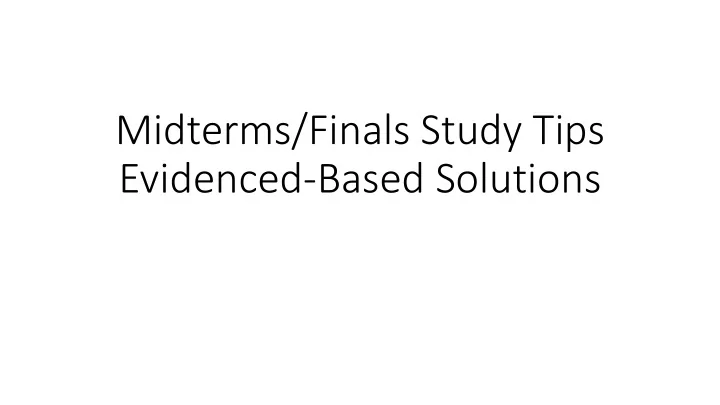

Midterms/Finals Study Tips Evidenced-Based Solutions
Midterms/Finals Study Tips • Why do we have midterms/finals? • What are ineffective strategies? • What works? • Why? • How to implement it?
Why do we have midterms/finals?
Why do we have midterms/finals? • Assessment • What are we trying to assess?
Why do we have midterms/finals? • Assessment • What are we trying to assess? • Learning • What does it mean to have learned something?
Why do we have midterms/finals? • To determine what will happen in the future • Will you remember important content knowledge? • Can you apply these topics? • Have you learned how to think?
What are Ineffective Strategies? • Re-reading • Re-copying notes • Underlining/Highlighting • Encoding Cues • Cramming
What are Ineffective Strategies? • Re-reading (66%) • Re-copying notes (33%) • Underlining/Highlighting (72%) • Encoding Cues (41%) • Cramming (66%) Hartwig & Dunlosky, 2012
Is Cramming That Bad?
What are Effective Strategies?
What are Effective Strategies? • Spacing • Retrieval Practice • Criterion Learning • Transfer Appropriate Learning • Successive Re-Learning
Spacing • Cramming • 12 hours of study in 1 day • Spacing • 3 hours of studying across 4 days
Spacing Cepeda, Pashler, Vul, Wixted, & Rohrer, 2006
Spacing Date Topic Hours Nov. 30 Biology 4 Dec. 1 Psychology 4 • How to implement it? Dec. 2 History 4 • Plan ahead! Dec. 3 Biology 3 • Create a schedule Dec. 4 Psychology 3 Dec. 5 History 3 Dec. 6 Biology 2 Dec. 7 Psychology 2 Dec. 8 History 2 Dec. 9 FRIDAY BREAK! Dec. 10 Biology 2 Dec. 11 Psychology 2 Dec. 12 History 2
Spacing Date Topic Hours Nov. 30 Biology 1 Dec. 1 Psychology 1 • How to implement it? Dec. 2 History 1 • Plan ahead! Dec. 3 • Create a schedule Dec. 4 Biology 2 Dec. 5 Psychology 2 • Let’s be realistic… Dec. 6 Dec. 7 History 2 Dec. 8 Dec. 9 Dec. 10 Biology 4 Dec. 11 Psychology 4 Dec. 12 History 4
Spacing Cramming Date Topic Hours Date Topic Hours Nov. 30 Biology 1 Nov. 30 Dec. 1 Psychology 1 Dec. 1 Dec. 2 History 1 Dec. 2 Dec. 3 Dec. 3 Dec. 4 Biology 2 Dec. 4 Dec. 5 Psychology 2 Dec. 5 Dec. 6 Dec. 6 Dec. 7 History 2 Dec. 7 Dec. 8 Dec. 8 Dec. 9 Dec. 9 Dec. 10 Biology 4 Dec. 10 Biology 10 Dec. 11 Psychology 4 Dec. 11 Psychology 10 Dec. 12 History 4 Dec. 12 History 10
Retrieval Practice • You have two choices for how to study for your final: • Option A • Study for 1 hour • Study for 1 hour • Study for 1 hour • Study for 1 hour • FINAL
Retrieval Practice • You have two choices for how to study for your final: • Option B • Study for 1 hour • Take a test • Take a test • Take a test • FINAL
Retrieval Practice Roediger & Karpicke, 2006
Retrieval Practice Roediger & Karpicke, 2006
Retrieval Practice Roediger & Karpicke, 2006
Retrieval Practice • Whyyyyy??? • Encoding • Retrieval
Retrieval Practice • How to implement it? • Flashcards • Do NOT turn over and read • PRACTICE RETRIEVAL! • Practice Tests • Ask your professor • Make your own
Criterion Learning • What do you do with flashcards after you answer them?
Criterion Learning • What do you do with flashcards after you answer them? Kornell & Bjork, 2008
Criterion Learning • What should you do with flashcards after you answer them? Kornell & Bjork, 2008
Criterion Learning • What should you do with flashcards after you answer them? Kornell & Bjork, 2008
Criterion Learning • How to implement it? • Metacognition • Flashcards • Keep track of correct answers • Make a mark on the card
Transfer Appropriate Processing • Are flashcards always the best?
Transfer Appropriate Processing • Are flashcards always the best? • It depends on the type of test! • TAP • Study consistent with test format Morris, Bransford, & Franks, 1977
Transfer Appropriate Processing • Are flashcards always the best? • Multiple Choice Test • Give yourself options on flash cards • Short Answer Test • Write out short answers • Essay Test • Don’t use flashcards
Successive Relearning • Combines all methods • Spaced retrieval practice to set criterion • How should you study? • Space out studying across X days • Practice retrieving information each time • Retrieve it at least once, but preferably thrice • Use the appropriate format Rawson, Dunlosky, Sciartelli, 2013
Basics • External factors influence your memory • Sleep • Memory consolidation • Stress • Glucocorticoids • Food • Neuronal function/connection/learning = protein formation • Relaxation • Attention Restoration Theory Berman, Jonides, & Kaplan, 2008
Questions?
Recommend
More recommend